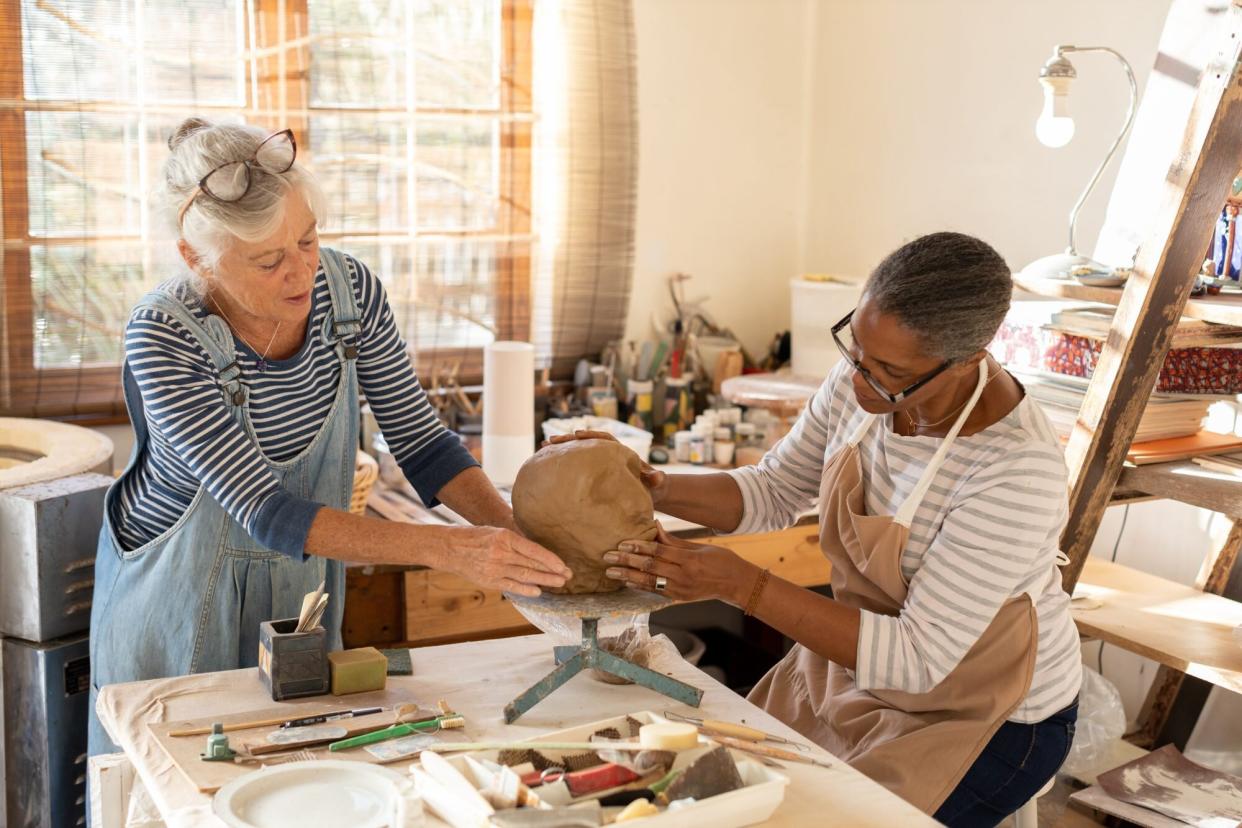Engaging in a Group Hobby Leads to Better Long-Term Health, Study Says

Alistair Berg / Getty Images
Exposing your brain to new types of stimuli—whether you're learning to swim, paint, or complete a crossword puzzle—helps keep it strong and healthy as you age. One study following adults who spent three months learning complicated things, including quilting and digital photography, found that the participants who engaged in "cognitively demanding, novel activities" improved their memory function. "If we do new things, our brain connections continue to develop," says University of Maryland Global Campus psychology professor Diane Finley. "It's exercising the brain—it's a muscle that has to be exercised, like any muscle."
Continued social interactions and a sense of community are also associated with positive health outcomes at every age, but they can be especially hard to maintain for older adults who have retired, moved to a new area to be closer to adult children, or lost a spouse or partner. According to a 2020 article in The American Journal of Geriatric Psychiatry, "the risk of premature mortality due to a lack of social connection is comparable to the risk due to maintaining an unhealthy diet, physical inactivity, alcohol misuse, and smoking."
Finding ways to combine new learning with continued socialization has other benefits, too: You can improve your physical health by taking up a sport; boost your mood by committing to an outdoor activity; and put more joy into your life by expanding the roster of activities that you find satisfying. Ask yourself these four questions to narrow down a list of potential new hobbies that you can take up in a group.
Related: The Best Hobbies to Establish Now for Improved Brain and Memory Health Down the Road
What are you interested in?
If you choose a new hobby based on something you're already good at—Italian classes when you already speak Spanish; bread-making when you're an avid baker; racquetball after years of tennis lessons—you may not gain the full range of brain-boosting benefits, says Finley, although even something that's only a little different is better than nothing new at all. It might be the best course of action if you're already nervous about meeting new people: Connecting with others who share your interests offers an immediate opportunity for new friendships.
Do you need cheerleaders?
Few—if any—people feel truly comfortable going into a new situation, explains Finley, but pushing yourself to join a group gives you a built-in support system as you conjugate French verbs, perfect your Zumba moves, or travel through a foreign country. "If you're going to try something new, you may not be good at it—but you just have to not worry about it," says Finley. "The more you do these things to put yourself out there, the easier it generally gets."
How much time do you want to commit?
If you don't want to spend hours every week practicing a new skill to truly become proficient, then pick something more "low-stakes," says Finley. Try a one-off knife skills class instead of a weekly pastry-making session, once-a-month group trips to nearby historical sites instead of a comprehensive lecture series, or a casual sports league instead of competitive running. "We are always learning at some level," says Finely. "How much different people need that learning and socialization is all very individual."
What's your focus?
Taking up a new hobby alongside a group of people you already know has benefits for introverts, who might hesitate to join the community center basketball team or a book club full of strangers. But if you ask a friend or family member to join you in your new endeavor, make sure you're both on the same page: "You have to decide on your primary focus," says Finley. "Is it learning the new skill, or it is socializing with your friends?" For her, a cake decorating class provided a relaxed atmosphere for chatting with old friends while perfecting fondant, but other activities—classic film showings, art gallery talks, lecture series'—require more quiet attention and less socializing.

